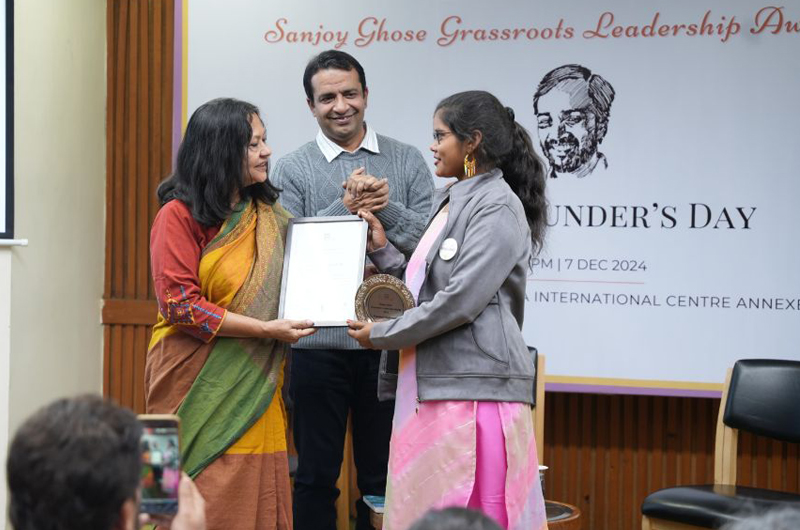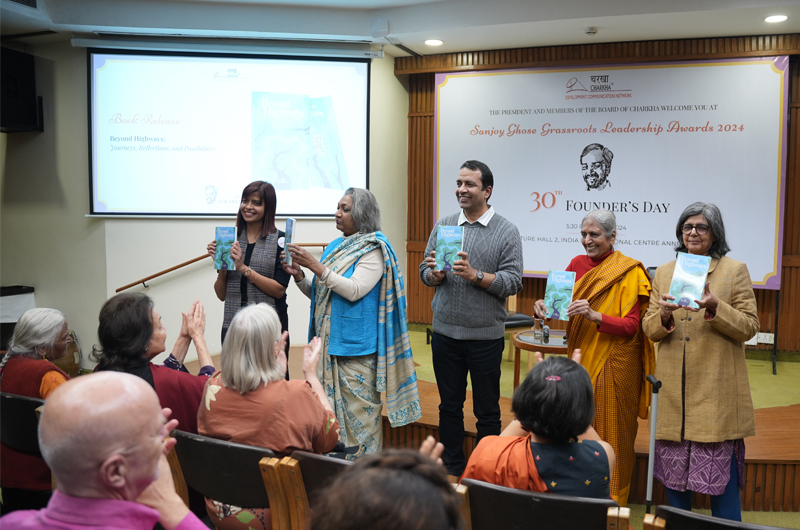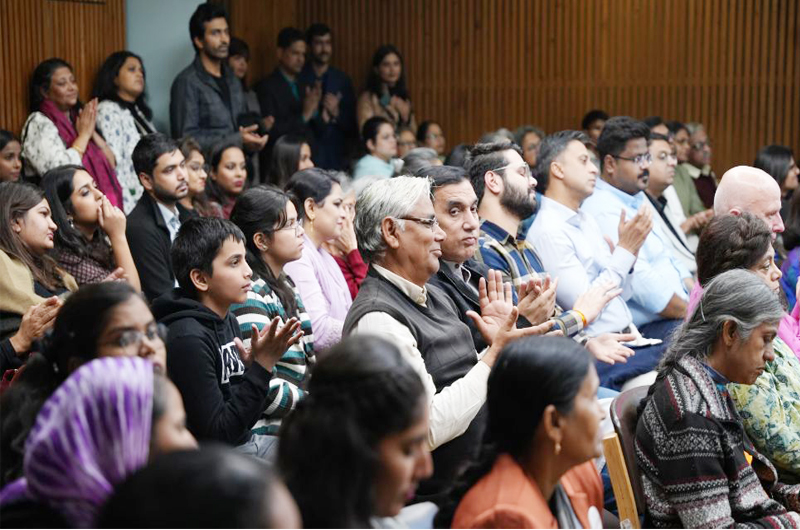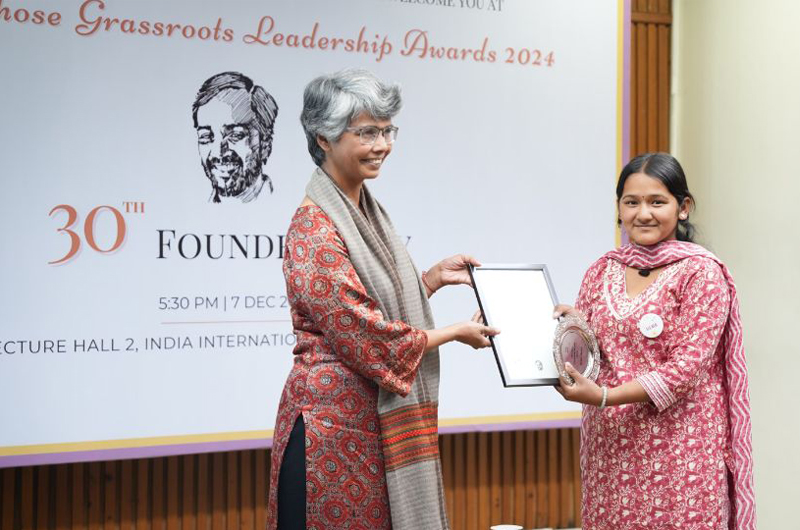Charkha Development Communication Network marked its 30th Founder’s Day on December 7 at the India International Centre Annexe in New Delhi. Grassroots leaders who are driving positive change in their communities, often in regions overlooked by mainstream discourse, were honoured. As Charkha completes three decades of amplifying marginalised voices, the milestone celebration reinforced its commitment to empowering grassroots leaders and fostering meaningful change in some of India’s most remote and underserved communities
In a powerful celebration of grassroots leadership, Charkha Development Communication Network marked its 30th Founder’s Day recently at the India International Centre Annexe in New Delhi. The event brought together a diverse group of change-makers, including social workers, citizens, and special guest Anshu Gupta, the founder of Goonj. The day was dedicated to honoring grassroots leaders who are driving positive change in their communities, often in regions overlooked by mainstream discourse.
The programme began with a tribute to Sanjoy Ghose, Charkha’s visionary founder, and the organisation’s former leaders — Shankar Ghose, Tilak Mukherjee, Mario Noronha and Anil Singh — who played pivotal roles in Charkha’s journey. The highlight of the celebration was the Sanjoy Ghose Grassroots Leadership Awards 2024, honouring three exceptional leaders for their relentless work in creating community-driven change:
- Heera Devi, a young social activist from Rajasthan, was recognised for her campaigns against child marriage, child labour and gender discrimination while empowering adolescents in Lunkaranasar.
- Shabnam Shaikh, a football coach from Mumbai’s Shivaji Nagar, was celebrated for fostering confidence and leadership among children, particularly girls, through football and community initiatives.
- Ramghani Meghwanshi, a grassroots leader from Ajmer, Rajasthan, was awarded for her work on skill development, menstrual health awareness, and combating child marriage and gender discrimination in Khwas Village.

social worker at Urmul Setu Sansthan, empowering adolescents.

with Parcham Public Trust Football, Mumbai, teaching football to children from marginalised communities, including many girls who were inspired
by her to start practising the sport.

Program of the Mahila Jan Adhikar Samiti in the city. She fights child marriage and gender discrimination.
This year’s awards, announced in October, aimed to spotlight the stories and efforts of leaders from underrepresented communities. From 144 inspiring entries across 14 states, mostly featuring women and adolescent leaders aged 18-35, the winners were chosen by an independent jury comprising sector experts Ashutosh Tosaria, Kashina Kareem and Ditilekha Sharma.
Conversations on leadership and dignity
A panel discussion titled The Importance of Grassroots Leadership and Collectivism featured a dynamic conversation between Deepa Lingariya, a 19-year-old disha sakhi (friend or mediator who shows the way) from Ganigaon in Uttarakhand, filmmaker Sehjo Singh, and Anshu Gupta. Moderated by Singh, the discussion delved into how grassroots organisations can bridge the urban-rural divide and work with young people to lead with dignity.
Gupta emphasised the untapped potential in rural areas, stating, “There is no dearth of resources and capabilities in these communities. What they need is self-reliance and innovation, grounded in dignity and respect for their rights.” He lauded Charkha’s work in amplifying grassroots voices and addressing the challenges faced by communities often overlooked by policymakers and urban centres.
Celebrating the spirit of the margins
Charkha CEO Chetna Verma announced the special Charkha President Award which was awarded to 20-year old Hema Rawal, a disha sakhi from Uttarakhand, for her work with adolescent girls in Garur Block. Former CEO Anshu Meshack presented her with the award, recognising her commitment to fighting for gender justice in remote Himalayan villages.

been associated with Charkha for years.
Ekatra, a documentary highlighting Charkha’s work in Ladakh, showcased how collectives run by young girls and boys in the region are creatively addressing social issues through different communication tools like puppetry, stop motion animation, photography to highlight local socio-economic challenges and to address the information gap among their rural communities.
This was followed by a powerful theatrical performance by Uttarakhand’s disha sakhis. Directed by Rajesh Nirmal, the play was based on Katyayani’s poem Hockey Khelti Ladkiyan (girls who play hockey) and where girls from the disadvantaged claimed their right to public spaces such as playgrounds and to fields like sports that are often dominated by men through their performance.
On the occasion, Charkha also launched its new publication, Beyond Highways: Journeys, Reflections, and Possibilities, chronicling the organisation’s three-decade journey. The book features contributions from former and current leaders, including Deepti Priya Mehrotra, Sujata Raghavan, Anshu Meshack and Chetna Verma, alongside 30 essays from grassroots leaders and changemakers reflecting on the conditions under which the organisation has survived, evolved and ultimately flourished.

The celebration concluded with heartfelt thanks delivered by Uzma Shamim, programme manager at Charkha. She acknowledged the invaluable contributions of Charkha’s team and supporters. The event was hosted by Jasmine Grover, Rucha Deore and Shams Tamanna, and made possible by the dedicated work of Ayushya Singh, Prashanta, Rahul, Nishtha, Manas, Pritish and Angel.
(This article is based on a press release from Charkha.)



 from Webdoux
from Webdoux